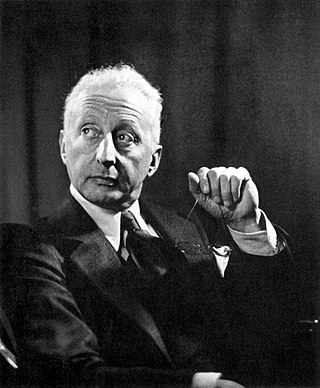
Jerome David Kern was an American composer of musical theatre and popular music. One of the most important American theatre composers of the early 20th century, he wrote more than 700 songs, used in over 100 stage works, including such classics as "Ol' Man River", "Can't Help Lovin' Dat Man", "A Fine Romance", "Smoke Gets in Your Eyes", "The Song Is You", "All the Things You Are", "The Way You Look Tonight" and "Long Ago ". He collaborated with many of the leading librettists and lyricists of his era, including George Grossmith Jr., Guy Bolton, P. G. Wodehouse, Otto Harbach, Oscar Hammerstein II, Dorothy Fields, Johnny Mercer, Ira Gershwin and Yip Harburg.

Oscar Greeley Clendenning Hammerstein II was an American lyricist, librettist, theatrical producer, and director in musical theater for nearly 40 years. He won eight Tony Awards and two Academy Awards for Best Original Song. Many of his songs are standard repertoire for vocalists and jazz musicians. He co-wrote 850 songs.

Otto Abels Harbach, born Otto Abels Hauerbach was an American lyricist and librettist of nearly 50 musical comedies and operettas. Harbach collaborated as lyricist or librettist with many of the leading Broadway composers of the early 20th century, including Jerome Kern, Louis Hirsch, Herbert Stothart, Vincent Youmans, George Gershwin, and Sigmund Romberg. Harbach believed that music, lyrics, and story should be closely connected, and, as Oscar Hammerstein II's mentor, he encouraged Hammerstein to write musicals in this manner. Harbach is considered one of the first great Broadway lyricists, and he helped raise the status of the lyricist in an age more concerned with music, spectacle, and stars. Some of his more famous lyrics are "Smoke Gets in Your Eyes", "Indian Love Call" and "Cuddle up a Little Closer, Lovey Mine".

Rodgers and Hammerstein was a theater-writing team of composer Richard Rodgers (1902–1979) and lyricist-dramatist Oscar Hammerstein II (1895–1960), who together created a series of innovative and influential American musicals. Their musical theater writing partnership has been called the greatest of the 20th century.
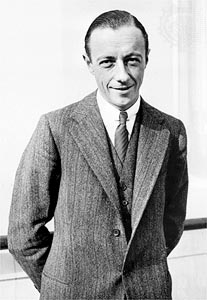
Vincent Millie Youmans was an American Broadway composer and producer.

Ella Fitzgerald Sings the Jerome Kern Song Book is a 1963 studio album by the American jazz singer Ella Fitzgerald accompanied by an orchestra arranged and conducted by Nelson Riddle. The album focuses on the songs of the composer Jerome Kern.
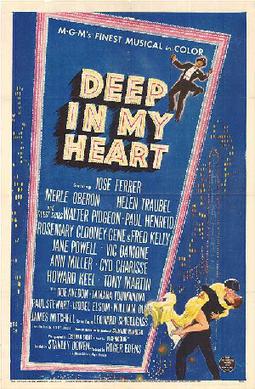
Deep in My Heart is a 1954 American MGM biographical musical film about the life of operetta composer Sigmund Romberg, who wrote the music for The Student Prince, The Desert Song, and The New Moon, among others. Leonard Spigelgass adapted the film from Elliott Arnold's 1949 biography of the same name. Roger Edens produced, Stanley Donen directed and Eugene Loring choreographed. José Ferrer played Romberg, with support from soprano Helen Traubel as a fictional character and Merle Oberon as actress, playwright, librettist, producer, and director Dorothy Donnelly.
Sunny is a musical with music by Jerome Kern and a libretto by Oscar Hammerstein II and Otto Harbach. The plot involves Sunny, the star of a circus act, who falls for a rich playboy but comes in conflict with his snooty family. This show was the follow-up to the 1920 hit musical Sally, both starring Marilyn Miller in the title roles, and it was Kern's first musical together with Hammerstein. Sunny also became a hit, with its original Broadway production in 1925 running for 517 performances. The London production starred Binnie Hale.
"I Won't Dance" is a song with music by Jerome Kern that has become a jazz standard. The song has two different sets of lyrics: the first written by Oscar Hammerstein II and Otto Harbach in 1934, and second written by Dorothy Fields in 1935.

Roberta is a 1935 American musical film released by RKO Radio Pictures and directed by William A. Seiter. It stars Irene Dunne, Fred Astaire, Ginger Rogers, and features Randolph Scott, Helen Westley, Victor Varconi and Claire Dodd. The film was an adaptation of the 1933 Broadway musical Roberta, which in turn was based on the novel Gowns by Roberta by Alice Duer Miller. It was a solid hit, showing a net profit of more than three-quarters of a million dollars.

"Who?" (1925) is a popular song written for the Broadway musical Sunny by Jerome Kern, Otto Harbach and Oscar Hammerstein II. The song was also featured in the film version of Sunny (1930) starring Marilyn Miller.
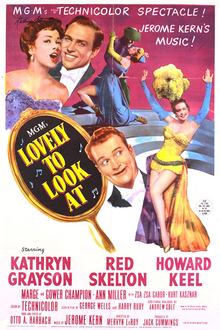
Lovely to Look At is a 1952 American musical romantic comedy film directed by Mervyn LeRoy, based on the 1933 Broadway musical Roberta.

Oscar Peterson Plays the Jerome Kern Songbook is a 1960 album by Oscar Peterson, of compositions by Jerome Kern.

Margaret Whiting Sings the Jerome Kern Songbook is a 1960 studio album by Margaret Whiting, with an orchestra conducted and arranged by Russell Garcia, focusing on the songs of Jerome Kern. Originally released as a double-LP set by Verve Records in 1960, it was reissued on CD by Universal in Japan and the United States (2002).

Sinatra Saga is a live album by Frank Sinatra, containing 2 discs of him performing live on stage from the 1950s to the 1980s.
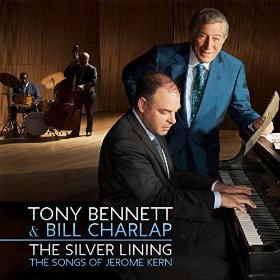
The Silver Lining: The Songs of Jerome Kern is a studio album by Tony Bennett and Bill Charlap, released by RPM/Columbia on September 25, 2015. The album includes covers of 14 songs composed by Jerome Kern, featuring Bill Charlap on piano, Peter Washington on bass, Kenny Washington on drums, and special guest the pianist Renee Rosnes on four two-piano tracks.
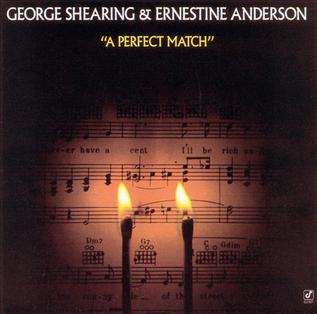
A Perfect Match is a 1988 album by jazz pianist George Shearing and the singer Ernestine Anderson. The pair had previously appeared together on Shearing's 1988 live album Dexterity.

Shining Hour is an album by guitarist Larry Coryell which was recorded in 1989 and released on the Muse label.

Sure Thing: The Jerome Kern Songbook is a 1994 album by André Previn and Sylvia McNair of songs by the composer Jerome Kern.


















